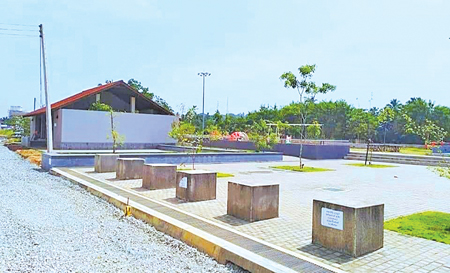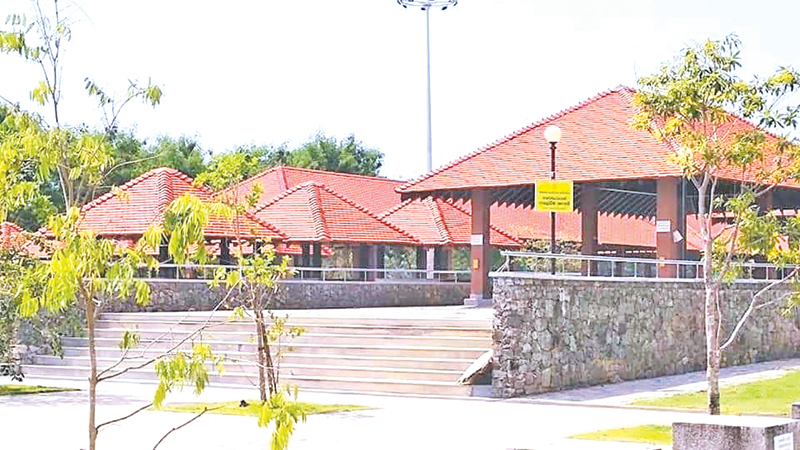 It was meant to be the newest gem in Matara’s tourism crown — a lush riverside escape with shaded benches, playgrounds, music platforms, and, for the thrill-seekers among us, crocodile viewing decks suspended over the Nilwala River. In theory, it was a brilliant idea. Nature, leisure, and a brush with danger — what could possibly go wrong?
It was meant to be the newest gem in Matara’s tourism crown — a lush riverside escape with shaded benches, playgrounds, music platforms, and, for the thrill-seekers among us, crocodile viewing decks suspended over the Nilwala River. In theory, it was a brilliant idea. Nature, leisure, and a brush with danger — what could possibly go wrong?
Quite a lot, apparently
Less than 72 hours after the grand opening of the Nilwala Riverside Park — or Nilwala Gangabada Udyanaya as it was introduced to the public — police officers and Special Task Force (STF) personnel showed up at its gates, not to enjoy a peaceful sunset or a riverside stroll, but to shut the place down. What followed was a surreal and tense public standoff between the authorities and the park’s self-proclaimed operators, all under the curious gaze of would-be visitors holding pre-booked tickets.
One man, presumably a key figure in the park’s operations, was caught on camera confronting the officers. “This is land I got through a tender — you can’t just shut it down because you are a police officer walks in and says so!” he protested, clearly upset that law enforcement would treat a public park like, well, public property.
The Police, however, had more than just a clipboard and a bad attitude. Acting on complaints and a letter from the Urban Development Authority (UDA), they explained that the park posed serious public safety risks, particularly due to unauthorised structures — some of them literally jutting into crocodile territory.
“We are here on instructions from the UDA,” an officer calmly said. “There are issues concerning public safety. Until these are resolved, the public cannot be allowed in.”
Undeterred, the park operator told the disappointed families and tourists at the gate that they were still welcome to come in. The Police, keeping their composure, politely but firmly stood their ground. “If you work here, you can go inside. But the public? No.”
Thus, on its third day of operations, the Nilwala Riverside Park was unceremoniously declared a prohibited zone. The Matara Chief Magistrate, Aruna Indrajith Buddadasa, acting on submissions from the local Police, ordered the park closed until August 26— giving it the unique distinction of being the country’s shortest-lived riverside tourist attraction.
A river runs through it
 Now, the concept itself was promising. A mixed-use recreational zone where people could unwind beside the Nilwala River, listen to live music, dine alfresco, and maybe even spot a crocodile or two — it’s the sort of thing that could elevate Matara’s profile among both local and foreign tourists. But wildlife, concrete and human recreations do not always mix well. Especially not when the “wild” in question has teeth.
Now, the concept itself was promising. A mixed-use recreational zone where people could unwind beside the Nilwala River, listen to live music, dine alfresco, and maybe even spot a crocodile or two — it’s the sort of thing that could elevate Matara’s profile among both local and foreign tourists. But wildlife, concrete and human recreations do not always mix well. Especially not when the “wild” in question has teeth.
Yes, the Park included a crocodile-viewing platform — perched, without authorisation, directly along the river. According to the UDA, this and other structures, including a two-storey restaurant propped up by three concrete pillars driven into the riverbed, were built without clearance, feasibility assessments, or even basic safety certifications. It’s not clear whether the entrepreneurs behind this venture thought the crocodiles would pose politely for photographs and sign waivers.
But crocodile spotting is no joke. These are apex predators — not Instagram props — and offering visitors a front-row seat to their basking and breeding grounds requires far more than enthusiasm and concrete.
Safety protocols must be strict, staff must be trained, and conservation authorities must be involved. What the Nilwala Park lacked was not ambition, but permission — and expertise.
The anatomy of an “Accidental” Park
At the recent Matara District Coordination Committee meeting chaired by Minister Sunil Handunnetti, things became clearer — and messier. The minister was informed that the park’s operators had reclaimed a portion of the riverbank illegally. They had built a massive concrete embankment and even gone so far as to erect a two-storey structure overlooking the river — without notifying, let alone getting permission from, any relevant authority.
The Urban Development Authority, for its part, was hardly amused. In a formal letter to the Acting Inspector General of Police, UDA Chairman L.B. Kumudu Lal said that the Park had not only been opened without the Authority’s approval, but that several of its structures were both unsafe and entirely unauthorised. Not exactly the textbook definition of sustainable tourism — unless, of course, the textbook was written in disappearing ink.
The UDA also highlighted that an unauthorised fence and a crocodile viewing platform had been built over public land, dangerously close to known crocodile habitats. Their recommendation? Immediate closure — until further notice, or at least until public safety could be guaranteed and the paperwork held up under scrutiny.
Of fences, forgery and fantasy
All of this begs a very obvious question: Why did it take until the ribbon was cut, balloons inflated, and the public ushered in, for the authorities to act?
Were these massive structures — including the restaurant in the river — constructed overnight? Did no one from the Local Government, police, or UDA happen to pass by during the months of construction? Surely, a multi-ton concrete embankment and crocodile-deck-on-stilts don’t exactly spring up like mushrooms after the rain.
Some might suggest that this episode reflects a familiar pattern: turn a blind eye until the problem becomes too big to ignore — then swoop in dramatically, ideally in uniform, and enforce the rules.
Others might say that this is a case of unchecked entrepreneurial zeal. A businessman sees an opportunity — tourism dollars via crocodile selfies and riverside tea — and decides it’s better to ask for forgiveness than permission. But when the ‘forgiveness’ comes with a court order, police cordon, and potential criminal investigation, that strategy loses its charm.
Business or trouble?
To be fair, the original idea of the park was not a bad one. In fact, if executed with proper consultation and collaboration, it could have become a hallmark of responsible ecotourism. Riverside parks are common in countries where environmental responsibility meets civic design. And crocodile gazing, when done properly, can be a highlight of wildlife tourism — educational, thrilling, and safe.
But in this case, tourism development seemed to have taken the “wild” part of “wildlife” a bit too literally.
Without safety fences, trained guides, crocodile behaviour monitoring, and emergency response plans, the venture went from exciting to reckless in record time.
What should have been a tourist attraction ended up as a cautionary tale.
A cautionary closure
On July 21, the UDA officially declared the park a prohibited zone. A notice went up, and the gates were shut — leaving behind confused visitors, frustrated business owners, and crocodiles that, thankfully, had not yet been provoked into demonstrating why humans shouldn’t build platforms over their living rooms.
Matara’s Nilwala Riverside Park is now closed for a month — at least officially. Whether it reopens will depend not only on how fast the owners can comply with safety regulations (and prove their documentation is genuine), but also on whether the authorities develop a more proactive approach to regulating such ventures.
Final thoughts from the riverbank
The moral of the story? When mixing nature, tourism, and business, it’s best not to skip the permissions — especially when dealing with prehistoric predators.
Perhaps next time, before building a riverside restaurant suspended over, or alongside crocodiles, one might consult an ecologist. Or the UDA. Or common sense.
Until then, the Nilwala River continues to flow — a little less disturbed, and a lot less photographed.









